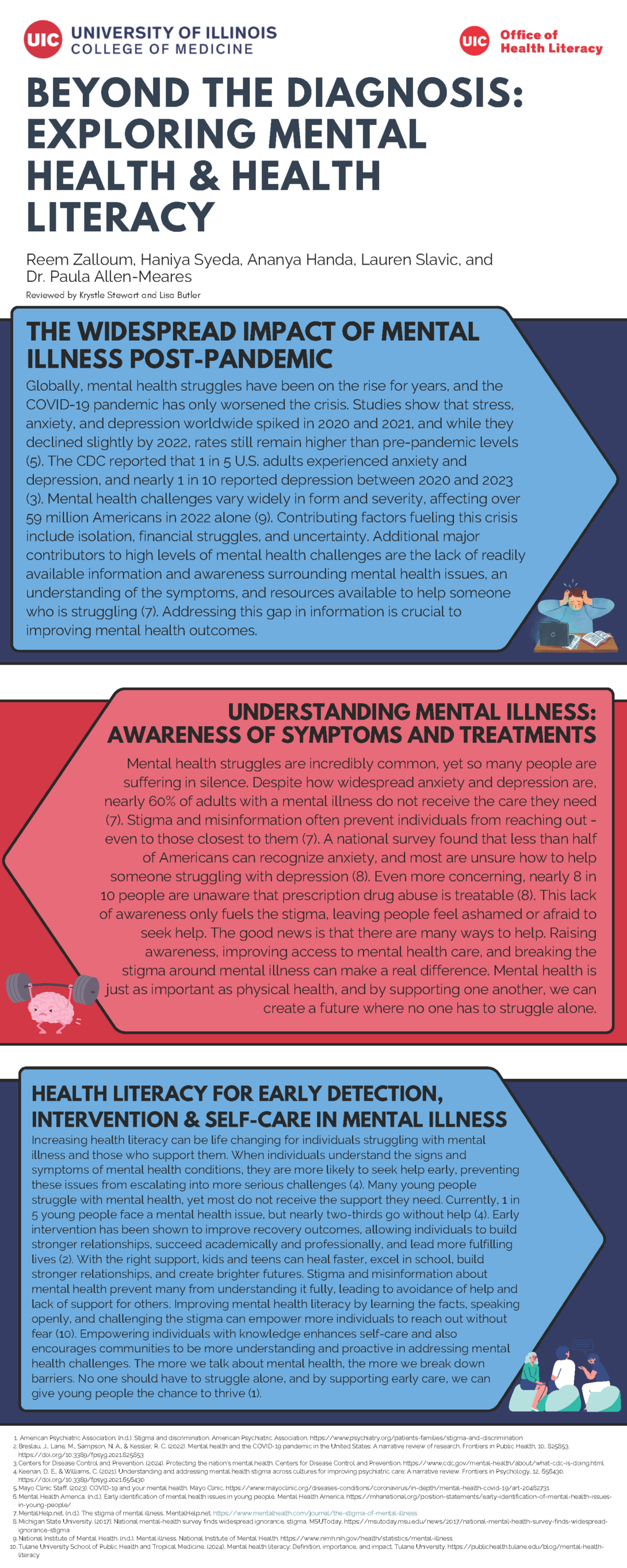Beyond the Diagnosis: Exploring Mental Health & Health Literacy
Reem Zalloum, Haniya Syeda, Ananya Handa, Lauren Slavic, and Dr. Paula Allen-Meares
Published April 1st, 2025. Heading link

The Widespread Impact of Mental Illness Post-Pandemic
Globally, mental health struggles have been on the rise for years, and the COVID-19 pandemic has only worsened the crisis. Studies show that stress, anxiety, and depression worldwide spiked in 2020 and 2021, and while they declined slightly by 2022, rates still remain higher than pre-pandemic levels (5). The CDC reported that 1 in 5 U.S. adults experienced anxiety and depression, and nearly 1 in 10 reported depression between 2020 and 2023 (3). Mental health challenges vary widely in form and severity, affecting over 59 million Americans in 2022 alone (9). Contributing factors fueling this crisis include isolation, financial struggles, and uncertainty. Additional major contributors to high levels of mental health challenges are the lack of readily available information and awareness surrounding mental health issues, an understanding of the symptoms, and resources available to help someone who is struggling (7). Addressing this gap in information is crucial to improving mental health outcomes.
Understanding Mental Illness: Awareness of Symptoms and Treatments
Mental health struggles are incredibly common, yet so many people are suffering in silence. Despite how widespread anxiety and depression are, nearly 60% of adults with a mental illness do not receive the care they need (7). Stigma and misinformation often prevent individuals from reaching out – even to those closest to them (7). A national survey found that less than half of Americans can recognize anxiety, and most are unsure how to help someone struggling with depression (8). Even more concerning, nearly 8 in 10 people are unaware that prescription drug abuse is treatable (8). This lack of awareness only fuels the stigma, leaving people feel ashamed or afraid to seek help. The good news is that there are many ways to help. Raising awareness, improving access to mental health care, and breaking the stigma around mental illness can make a real difference. Mental health is just as important as physical health, and by supporting one another, we can create a future where no one has to struggle alone.
Health Literacy for Early Detection, Intervention & Self-Care in Mental Illness
Increasing health literacy can be life changing for individuals struggling with mental illness and those who support them. When individuals understand the signs and symptoms of mental health conditions, they are more likely to seek help early, preventing these issues from escalating into more serious challenges (4). Many young people struggle with mental health, yet most do not receive the support they need. Currently, 1 in 5 young people face a mental health issue, but nearly two-thirds go without help (4). Early intervention has been shown to improve recovery outcomes, allowing individuals to build stronger relationships, succeed academically and professionally, and lead more fulfilling lives (2). With the right support, kids and teens can heal faster, excel in school, build stronger relationships, and create brighter futures. Stigma and misinformation about mental health prevent many from understanding it fully, leading to avoidance of help and lack of support for others. Improving mental health literacy by learning the facts, speaking openly, and challenging the stigma can empower more individuals to reach out without fear (10). Empowering individuals with knowledge enhances self-care and also encourages communities to be more understanding and proactive in addressing mental health challenges. The more we talk about mental health, the more we break down barriers. No one should have to struggle alone, and by supporting early care, we can give young people the chance to thrive (1).
Published April 1st, 2025.
Footnotes Heading link
- American Psychiatric Association. (n.d.). Stigma and discrimination. American Psychiatric Association. https://www.psychiatry.org/patients-families/stigma-and-discrimination
- Breslau, J., Lane, M., Sampson, N. A., & Kessler, R. C. (2022). Mental health and the COVID-19 pandemic in the United States: A narrative review of research. Frontiers in Public Health, 10, 825853. https://doi.org/10.3389/fpsyg.2021.825853
- Centers for Disease Control and Prevention. (2024). Protecting the nation’s mental health. Centers for Disease Control and Prevention. https://www.cdc.gov/mental-health/about/what-cdc-is-doing.html
- Keenan, D. E., & Williams, C. (2021). Understanding and addressing mental health stigma across cultures for improving psychiatric care: A narrative review. Frontiers in Psychology, 12, 656430. https://doi.org/10.3389/fpsyg.2021.656430
- Mayo Clinic Staff. (2023). COVID-19 and your mental health. Mayo Clinic. https://www.mayoclinic.org/diseases-conditions/coronavirus/in-depth/mental-health-covid-19/art-20482731
- Mental Health America. (n.d.). Early identification of mental health issues in young people. Mental Health America. https://mhanational.org/position-statements/early-identification-of-mental-health-issues-in-young-people/
- MentalHelp.net. (n.d.). The stigma of mental illness. MentalHelp.net. https://www.mentalhealth.com/journal/the-stigma-of-mental-illness
- Michigan State University. (2017). National mental-health survey finds widespread ignorance, stigma. MSUToday. https://msutoday.msu.edu/news/2017/national-mental-health-survey-finds-widespread-ignorance-stigma
- National Institute of Mental Health. (n.d.). Mental illness. National Institute of Mental Health. https://www.nimh.nih.gov/health/statistics/mental-illness
- Tulane University School of Public Health and Tropical Medicine. (2024). Mental health literacy: Definition, importance, and impact. Tulane University. https://publichealth.tulane.edu/blog/mental-health-literacy